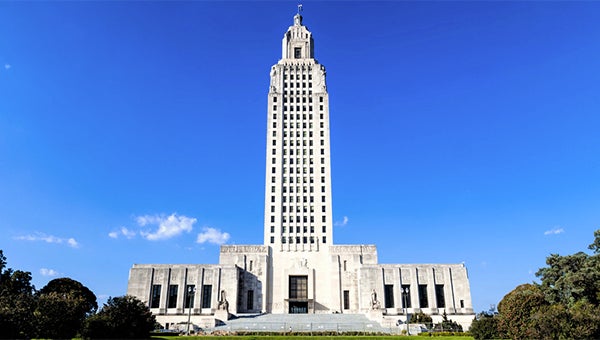City may clean up blight: Proposal would force homeowners to pay for work
Published 7:19 am Friday, July 1, 2016

- DAILY NEWS PHOTO/Jesse Wright Lamaunt Riggins, a city employee, power washes City Hall Wednesday, cleaning it off in time for the Fourth of July. Cleanliness was the topic at Tuesday’s town hall.
The city of Bogalusa may soon maintain problem properties in the city and then charge property owners as part of their property tax bills.
The idea was floated at Tuesday’s town hall meeting, and the two city council members in attendance, Gloria Kates and Doug Ritchie, both seemed to support the idea as did Mayor Wendy Perrette. Attorney Bill Arata, who has been organizing the town halls, mentioned that other cities operate this way, and he said it could put teeth in the current zoning codes.
At present, the city has two code enforcers, Rodney McGehee and Kelley Sharpe, and though they stay busy, they have no power to make any immediate corrections. They may write tickets that are served by certified letter, but homeowners and property owners can ignore the tickets or fight them through city court, and that process could take months.
“It seems like there would have to be a whole raft of ordinances that would have to pass in order for you to do the work you need to do,” Arata said to McGehee.
James Hall also pointed out that at present, anyone who lives outside of Bogalusa but owns land in Bogalusa can ignore tickets from the city.
“We have written a ticket on every ordinance we have,” he said. “But we can’t touch people who don’t live in the city.”
“What we’re talking about, if you don’t comply with the ordinance, we’ll come clean up your property and put it on your taxes,” Arata said.
State law already allows cities to clean up blighted property and overgrown yards in this manner, but the city council needs to approve the measure.
“They’ll pay their taxes; they’ll pay the bill. Or they’ll lose their property,” Arata said.
Fate Ferrell suggested looking to other cities that are cleaner and adopt their laws.
“The state of Wisconsin, they’re one of the cleanest places in the United States,” Ferrell said. “Their laws work. Get a copy of their laws.”
He suggested checking Milwaukee’s laws specifically.
Ritchie said he’d look into those laws and he told Arata the city could adopt new code enforcement measures within a month with board approval.
In the meantime, the city is poised to pass two new ordinances. One ordinance would raise the price for wheeled vendors from $250 for a year to $1,000 and another ordinance would only allow yard sales the first weekend of the month. This ordinance is meant to put a stop to several “front yard stores” that are operating informally in front of homes. McGehee said he knew of one house that is home to an “all day/all night” garage sale.
“The garage sale ordinance is not something that’s new to the state of Louisiana,” McGehee said. “It’s new to Bogalusa. For the last five or six months citizens complained that there are ongoing yard sales and cars showing up all the time to people’s houses … Some people had items in their front yards constantly just covered up with tarps… There are between five and 10 perpetual garage sales going on at all times. These people have stores set up there. One lady has cash registers set up in her front yard.”
McGehee said some cities, like Covington, forbid all yard sales and other cities allow only a set number per year with a paid permit. Other cities, like Abita Springs, allow them only at a certain time of the month.
The increase for wheeled vendors would apply to carts selling Mardi Gras items and to food trucks.
“It’s to be fair to the brick-and-mortar stores,” Hall said.
Perrette pointed out that the mobile vendors have lower overhead and they don’t pay city taxes, so an increase in permit fees makes sense.
Both these changes to city codes will be voted on at the next city meeting on Tuesday, July 5.
Overall, Arata said the town hall on Tuesday was a success, and he said he thought the ideas discussed were good ones. He also suggested that code enforcement should be the topic of the next town hall meeting, although no date for that has been set yet.




